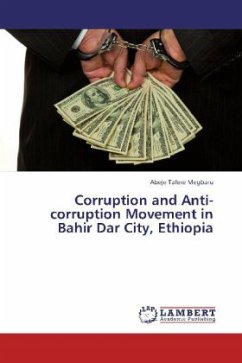
Corruption and Anti-corruption Movement in Bahir Dar City, Ethiopia
Versandkostenfrei!
Versandfertig in 6-10 Tagen
32,99 €
inkl. MwSt.

PAYBACK Punkte
16 °P sammeln!
Most Scholars and institutions that are working in the area of anti corruption movement agree that corruption is not a simple social phenomena that can be expressed in simple cause and effect relationship model, but it is an interwoven social phenomena caused by the demand and Supply side of corruption. This situation calls for designing a strategy that mitigates corrupt practices by involvement of the public. Even though, the magnitude and its severity is not as much we fright it at this movement, the responsible bodies have to give effective training to the inhabitants on the what, why, and ...
Most Scholars and institutions that are working in the area of anti corruption movement agree that corruption is not a simple social phenomena that can be expressed in simple cause and effect relationship model, but it is an interwoven social phenomena caused by the demand and Supply side of corruption. This situation calls for designing a strategy that mitigates corrupt practices by involvement of the public. Even though, the magnitude and its severity is not as much we fright it at this movement, the responsible bodies have to give effective training to the inhabitants on the what, why, and the how aspect of corruption; examining and redesign the practice and work procedures which are prone to corruption; opening Sub-branch offices at selected sites of the region; strengthening the ongoing Civics and Ethical Education; strengthening intelligence, surveillance and an incentive system; and lastly, the best remedy is ensuring good governance. This book will create good in sight for those institution who are working in the area of Anti-corruption movement and the government in designing a mechanism to tackle corruption in the city Administration and at large in the Regional stat












